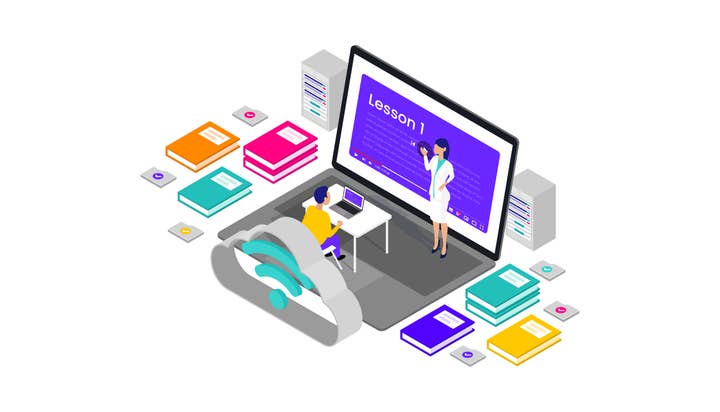Understanding the barriers facing games students – and how to remove them
At GDC, Cristina Amaya and Kenzie Gordon went through some of the issues with game education, and what could help students and new graduates
Earlier this year, a GDC talk entitled 'From Rosy-Eyed to Dissatisfied: What Game Education Is Missing' addressed the main issues game students encounter, and how to solve them.
The talk was presented by Cristina Amaya, president of Latinx in Gaming and director at DreamHack, and Kenzie Gordon, PhD candidate and instructor in Media and Technology Studies at the University of Alberta, Canada.
Gordon is also the project manager for The First Three Years, a longitudinal study which follows game students post-graduation.
"Basically what we're doing is we're talking to people the year that they graduate from their game program, and every year for three years after that, to see what that transition into the games industry is like for people," she explained at GDC.
"So when people are coming out of their final year of their program, we're interested in what kind of things were covered in their program. Did they have opportunities for internships and professionalisation? What was their game education experience like? And then, after that, we want to hear about how that transition has been going for them, what kind of networks have been supportive, how has that experience gone."
"The overarching question is what helps grads, especially people who are from marginalised backgrounds, find and keep jobs in the industry"Kenzie Gordon
And that's whether they make it into games or not, with Gordon noting that it's equally important for the study to talk to students who don't end up in games, to understand what happened.
The study is currently in its second year, so the answers analysed during the talk focused on students just post-graduation, but it still provides a fascinating insight into the issues they're facing. The research is being done collaboratively by four Canadian universities (Western University, University of Alberta, University of Waterloo, and York University) in partnership with the Higher Education Video Game Alliance (HEVGA).
"The overarching question is what helps grads, especially people who are from marginalised backgrounds, find and keep jobs in the industry," Gordon explained.
The research team talked to about a hundred students across the US and Canada (it's limiting itself to these two regions for scalability reasons) for this first phase.
"In terms of who they are, about half are white, then the next largest group is East Asian, as well as mixed race folks," Gordon said. "The students we're talking to are actually a little bit more diverse than the industry, which is partially [the result] of the diverse people getting kicked out of the industry in the first few years.
"About 39% of our sample identifies as LGBTQ, which is obviously higher than the general population, but is actually pretty on par with what the game industry tends to be. About a third of our participants identify as having a mental or physical difference. And interestingly, sadly, about 20% of our participants feel that an aspect of their identity has already negatively affected their experience in the games industry – and most of them have not actually worked in the games industry yet."
What are game students worried about when graduating?
The first part of the talk focused on students' apprehensions when graduating, with Gordon saying that the main thing is that they are "fearful," with working conditions and discrimination being the main worries.
"[Most new grads we talked to] really desperately want to work in the games industry. It's often a dream they've had since they were kids but also, overwhelmingly, they are afraid of what that's going to be like.

"And that could be afraid of things like crunch or what the work conditions are going to be like. But also a lot of people are worried about discrimination in the workplace [and running] into these barriers. A lot of people tell us that the primary reason that they would leave a workplace is toxicity or that it was not a welcoming environment for them but, when we ask them, the majority also say that they would take any job, even at a company that they knew would have a bad reputation for how to treat people because they are so desperate.
"[It's a] catch-22 situation that a lot of new grads are finding themselves in: on the one hand, they know these problems exist and they really don't want to deal with them but, on the other hand, they want to work in games and they will do whatever it takes to get through that. Which I think is the reason why we see people hit the wall so soon in games."
What are the issues with game programs?
Crunch
Gordon then shared findings about the issues that come up for students when studying. And one recurring theme is crunch.
"Most people are aware of [crunch] and their instructors are helping them understand it, but we're also hearing that in a lot of programs, the structure of the program makes students crunch.
"And I don't think this is unique to games. Crunch is kind of how university works, but a lot of students are hearing that crunch is bad and that's not how you should make games, but they're not learning any other way to make games in their program."
This is due to the fact most semesters are organised as a condensed development cycle, she pointed out.
Challenges getting work experience
Getting work experience was another facet of the issues with game programs, Gordon said.
"About 75% of the institutions that we've heard about have some kind of work experience placement. But it is often up to the student to find the internship and it's often not guaranteed, or there's not enough for everybody in the program."
The problem becomes tenfold if you're a student who has to work alongside school because then you are less likely to be able to take on an unpaid internship, for instance.
Lack of career counselling
Lack of career counselling alongside studying was another pain point identified as part of the study.
"Very few programs that we've talked to have game specific career counselling as a structured aspect of the program," Gordon said. "Some people have been referred to their university's career centre, but generally we hear that a university career centre is not very well equipped to help people in games or in any creative industry."
Lack of faculty diversity
The lack of diversity within universities is another issue, with Gordon noting that while there's a relative gender parity in some of the programs the study looked into, the reality is that the art disciplines are often dominated by women while computer science is dominated by men, for example.
"There's really a lack of that diversity to match the diversity of the students," she continued. "And commensurate to that is a lack of knowledge or firsthand experience about what discrimination looks like in the games industry.
"As opposed to crunch where a lot of professors are very aware of it and talking about it, discrimination and harassment might come up but often the professors don't really have the lived experience of how to deal with that in the workplace, which is a shortcoming that a lot of students identify."
Difficulty to build a portfolio
Finally, another recurring theme highlighted by students was the difficulty to build a portfolio.
"A lot of students identify that they're just not getting [what they're looking for] for their portfolio from their coursework. Particularly art students, for example, say that the way that rapid prototyping works in the course of a capstone [means] they never really get any polished materials that are the things they hear they need to have in their portfolios.

"But more than that, most students we talked to have heard from their professors that it's not enough to have just your coursework projects in your portfolios. But of course only certain groups of students have the time and capacity to do these side projects that build that robust portfolio that their professors tell them the industry wants.
"So students of colour for example, or people with caretaking responsibilities, are already getting kind of kneecapped when it comes to that portfolio development because their peers are bringing a more robust portfolio than they are, from things outside of the coursework."
This is where the work of organisations like Latinx in Gaming is crucial, Cristina Amaya said, also pointing to the Black in Gaming Foundation and Women in Games International as groups that help bridge these gaps. Latinx in Gaming for instance helps students find a path in the industry and develop careers.
What are the issues that graduates from marginalised groups deal with?
Gordon spent some time focusing especially on the challenges facing students and new grads from marginalised backgrounds.
"I think number one is this kind of pipeline that causes marginalised folks to leave," she said. "This idea of the leaky pipeline is nothing new but what I think perhaps is newer is this idea that it's leaky for specific people. And it's leaky partially because of the structural conditions of game education."
Said conditions are all the issues highlighted above – unpaid work experience, lack of faculty diversity, crunch, and so on – and how they're particularly impacting students from underrepresented groups. She noted that it means that these students are already a "step further down the burnout road before they even get into the industry."
"We know that a lot of students crunch for basically the majority of their game education. Then they are willing to take any job in games that they can get into. So they don't really have a lot of capacity to make workplace choices that are going to be a healthy work environment for them.
"Game developers from [under-represented] backgrounds are [one] step further down the burnout road before they even get into the industry"Kenzie Gordon
"And so we get to this situation where students are maybe getting three or four years into working in the game industry but they already have six or seven years of this very intense development cycle work under their belt, and by the time they have enough experience that they can start to rise and get out of these entry level positions, they're already hitting that burnout threshold because they've backlogged so much of that work when they were in their education program.
"And they're just not developing skills to deal with it in school [because] crunch is part of it and it's kind of inextricable."
Amaya noted that the most recent waves of graduates did so during a global pandemic, but also "seeing the Me Too movement take prevalence, seeing lawsuits, allegations," and so on.
"It's a question of which company is worse," she said, mentioning the 'Great Resignation'. "Millennials go from one company to another, leave within one or two years because that company was just as bad in terms of burnout culture.
"Also there are low salaries compared to market value in the cities that we live in – on average it's below 10% to 20%. In marketing especially, but in a couple of other fields as well. And that's such a shame because we are part of the tech industry so we should be paid at that salary."
What can be done to alleviate game education concerns?
Having meaningful conversations and diversifying academia
Addressing what can be done about "all of these extremely depressing things," Gordon said that one way forward involves "having more intentional conversations about harassment, about discrimination, in game education."
While these conversations arise everytime a company is in the news for its cultural issues, there's no "systematic attempt" as part of coursework to discuss what can be done if you're facing discrimination in the workplace, for instance.
"It's really important to remember that these are conversations you need to have with all groups of students because the marginalised students will be talking about this among themselves already. But really it's the cis-het white students who really need to be part of those conversations, and recognising that that is part of the cultural problem.
"There are organisations that can create those pathways but companies themselves should be creating them as well, and not just as part of a diversity inclusion program"Cristina Amaya
"We do talk to a fair number of students who are part of the population that is more 'protected' or has an easier time in games, and there's a few of them that act as allies, they would speak out in a workplace where there was discrimination, but for a lot of them, it's not even on their radar that it's happening.
"Whereas, obviously, a dev of colour or of a marginalised gender, they know. It's not a surprise to them that these things happen. So these conversations need to engage everybody, and how can we make workplaces that are safer and more inclusive for everyone. And I think part of that comes back to who is an instructor in a game education program.
"We hear from a lot of students who have instructors that look like them that they're less fearful about the conditions in the industry. Because they hear about strategies to deal with it, they hear that these people still love working in games and they were able to find workplaces that work for them. Whereas if you only hear from people who've never really experienced it, it kind of remains this bogeyman that you have like no tools for how to deal with it. So part of it comes back to diversifying the academy which, of course, is a much bigger problem than games alone."
Addressing crunch in education as a barrier to equity
The second aspect of dealing with these challenges is "addressing crunch in education as a barrier to equity," Gordon noted.
"[It's] not just a problem in the industry but in education as well, that we're creating these conditions where people are not able to learn how to do healthy game development, and recognising that this kind of program style disproportionately impacts certain groups of students."
The study is not talking to students who didn't make it to the end of their program, Gordon highlighted, with a very significant percentage of students dropping because it's so intense. And again this is going to disproportionately affect students from marginalised backgrounds.
"We need to think about how the way we structure a program not only informs the kind of skills that the students come out with but also… Can they come out? And do they come out in a place where they're prepared to work in the industry for the long term and they're not just going to crash and burn in three years because all they learnt how to do is this intense dev cycle?"
Providing a path for growth
Amaya added that it's also a question of "creating pathways for talent growth within the industry."
"There are organisations that can create those pathways but companies themselves should be creating them as well, and not just as part of a diversity inclusion program," she said. "Think of something within your teams, think hiring practices, think of making sure to level up the young folks that enter and provide them an actual path to success.
"I spoke to a company that provides living stipends for students who are joining as interns, and then have those stipends increase over time the longer they stay in the company. I thought that was really interesting, especially considering salary discrepancies that might happen.
"We also want to make sure you're investing in talent. There are companies that invest in their education, invest in coursework for them, getting them mentors, providing them opportunities for growth so that they might be a good asset not just to the company, but as they progress in their career."
More GamesIndustry.biz Academy guides to Working in Games
Our guides to working in games cover various perspectives, from hiring to retention, to landing the job of your dream or creating the right company culture:

